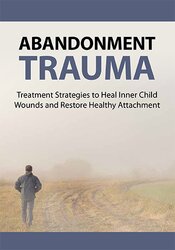
×

Stuck in self-fulfilling cycles of mistrust, many clients expect abandonment and inadvertently create situations that reinforce those expectations.
As therapists our role is to dive into the heart of those abandonment fears, and help them heal the traumatic childhood wounds impacting their adult lives and relationships.
But for some clients “trusting” is a place where they’ve been hurt before, making deep therapeutic work difficult to get off the ground. Others can be too clingy, looking for you to meet their intense need for reassurance and connection.
That’s why expert Ellen Biros created this training -- to provide you a roadmap to navigate the complexities of abandonment trauma so you can offer your clients direction, hope, and the keys to healing.
In just one day, she’ll guide you through the practical and effective approaches you need to build trust with these clients, help them overcome their abandonment fears, and forge a path toward lasting healing and better relationships.
With specific exercises from CBT and DBT you can use right away, you’ll end this course ready to help your clients set healthy boundaries, reduce their exposure to toxic relationships, and reframe the negative thought patterns about self-worth and rejection that have been holding them back.
This training is a valuable addition to any therapists’ treatment toolkit.
So don’t wait.
Register now!
All members of the PESI, Inc. planning committee have provided disclosures of financial relationships with ineligible organizations and any relevant non-financial relationships prior to planning content for this activity. None of the committee members had relevant financial relationships with ineligible companies or other potentially biasing relationships to disclose to learners. For speaker disclosures, please see the faculty biography.
Continuing education credit information is coming soon for this live webcast.

Ellen Biros, LCSW, C-PD has over 25 years of experience working with individuals struggling with trauma, anxiety, substance abuse, depression, domestic violence, and personality disorders. She’s a Certified Personality Disorder Treatment Provider (C-PD) and specializes in working with survivors of narcissistic abuse and other manipulative personality disorders. Ms. Biros has trained thousands of therapists on a variety of issues including emotional manipulation, personality disorders, and covert abuse. She’s an adjunct faculty member at The University of Phoenix in the School of Social Work and was formerly an adjunct at Tulane University’s School of Social Work. Ms. Biros is the author of Recovering from Narcissistic Mothers: A Daughter’s Workbook.
Speaker Disclosures:
Financial: Ellen Biros maintains a private practice and has an employment relationship with the University of Phoenix. She receives royalties as a published author. Ellen Biros receives a speaking honorarium and recording royalties from PESI, Inc. She has no relevant financial relationships with ineligible organizations.
Non-financial: Ellen Biros is a member of the National Association of Social Workers, the Georgia Society of Clinical Social Workers, and the American Clinical Social Work Association.
|
Abandonment Trauma: Treatment Strategies to Heal Inner Child Wounds and Restore Healthy Attachment
Mon, Jan 13, 2025 - 09:00am to 05:00pm EST - Product Code LWC059811 |
Please note: There will be a 70-minute lunch and two 15-minute breaks; one in the morning and one in the afternoon. Lunch and break times will be announced by the speaker and at their discretion. A more detailed schedule is available upon request.
For live CE credit, you must watch the live webcast in its entirety at its scheduled time and complete the CE quiz and evaluation within one week. You will have access for 90 days after the program for review.
Visit our FAQ page at https://www.pesicanada.ca/faq or contact us at https://www.pesicanada.ca/contact-us.
Abandonment, Attachment, and Early Experiences
Trauma and the Spectrum of Abandonment
Recognize Signs and Symptoms
The Abandonment Trauma Treatment Toolbox: CBT and DBT Strategies and Exercises to Repair Inner Child Wounds
Therapeutic Relationship and Therapist Self-Care
Satisfaction Guarantee
Your satisfaction is our goal and our guarantee. Concerns should be addressed to info@pesicanada.com.
Please wait ...